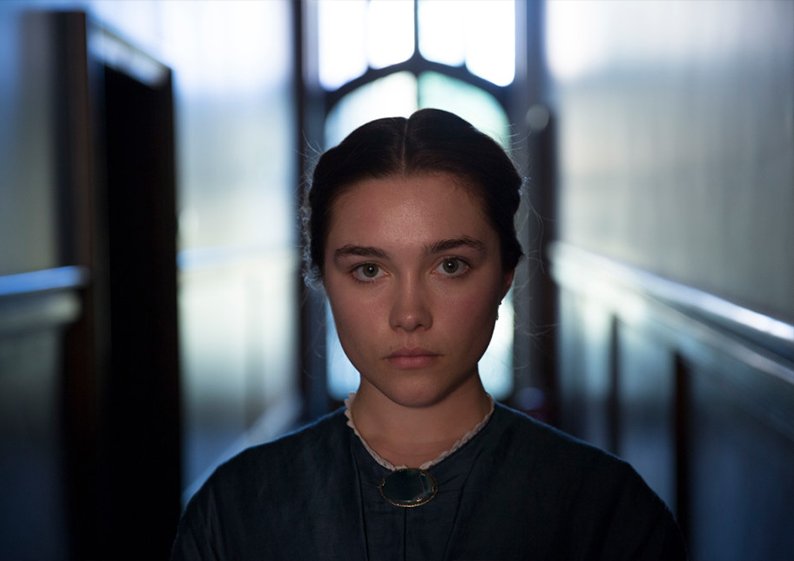


As this spare and striking drama opens, the camera slowly pans around the veiled face of an anxious young bride, who's glancing around the room in palpable unease as she struggles to sing in tune. Her voice pipes and cracks over the lusty baritone of her new husband beside her, whose face remains out of shot. We don't meet him until later that night, when he bursts into the marital bedroom and brusquely demands that his wife remove her nightdress. Slowly, reluctantly, she does so; he briefly appraises her body, then turns over with a grunt and makes as if to sleep. As the scene fades, she's still standing there naked, innocent and awkward, unsure whether or not she's meant to climb into bed beside him.
William Oldroyd's debut feature is carried by the superb acting of young actress Florence Pugh, whose performance as Katherine, across her development from wide-eyed ingenue to unscrupulous femme fatale, is mesmerising. Screenwriter Alice Birch has skilfully adapted Lady Macbeth of the Mtsensk District, an 1865 novel by Russian writer Nikolai Leskov comparable, thanks to its interrogation of the constricted lives of provincial upper-class women and the temptations of adultery, with Flaubert's 1856 novel Madame Bovary which has already served as the basis for a 1934 opera by Shostakovich and a 1962 film, Siberian Lady Macbeth, by Polish director Andrzej Wajda. This pared-down version, shot on location at Lambton Castle, transposes the brooding landscape of Siberia into bleak and misty nineteenth-century Northumberland. Katherine, it transpires, was sold to her brutish, wild-eyed husband Alexander (played by Paul Hilton), the son of a rich mine-owner (Christopher Fairbank), as part of a package including a patch of land which, her father-in-law snarls, was not fit for a cow to graze upon. It soon becomes clear that for the men, who embark swiftly on a campaign of psychological and physical abuse, Katherine herself is of little more value than that animal. They insist that she remain closeted, alone, inside the house, darkly hinting at her own fragility in the guise of concern for her health, though she keeps protesting that she's more comfortable in the fresh air (and some of the film's most joyful scenes come when she does rebel and wanders in bliss through fields and marshes). She's expected to wait up for her husband while he drinks with associates when she moves to go to bed, her father-in-law dispatches a servant to keep her awake, her autonomy entirely subjected to the whims of the autocratic household. Her maidservant Anna brushes her hair roughly, pours scalding water on her in the bath, and fastens her too tightly, with the slightest glimmer of relish, into corsets. We're gunning for Katherine to resist and liberate herself from this despotism and when Alexander is called away on business and she embarks on an affair with rugged, ribald groomsman Sebastian (Cosmo Jarvis), the narrative seems poised to morph into a Lady Chatterley-style love story. But this drama quickly takes a far more disturbing turn, as defiant Katherine tests the boundaries of her own new-found command, the stakes raised to dangerous and dizzying heights.
The action is stripped down, the drama distilled into a few heightened moments. The aesthetic, too, is elegant and understated: natural light illuminates the pastels of the walls and the sky, while in her deep blue dress Pugh stands out like the subject of a Vermeer painting. Oldroyd has boldly refused to rely on music to create atmosphere; instead, mirroring Katherine's increasing sense of claustrophobia, we're made acutely aware of the slightest noises around the sparsely decorated house, which is entirely devoid of material comfort: floorboards creaking and doors slamming, while the camera lingers on shots of empty chairs, a ticking clock, an occasional cat warily prowling. As Katherine gains strength, the film picks up pace, yet each plot development retains the capacity to shock though her mind becomes harder to read as her decisions grow increasingly erratic. Tense power struggles, more or less explicit, propel the narrative, which also explores subtle questions of class, gender and race: perhaps the most complex relationship is that between Katherine and her black servant Anna, who loses her voice as Katherine gains hers, forcing us to reflect on the different forms of acute oppression being played out before us. Perhaps the most masterful power-play in this film is that enacted between director and audience. Having become invested in Katherine's trajectory towards freedom, we are left helplessly complicit in her dangerous, compulsive turn towards amorality and revenge.
Words by Francesca Wade
Add a comment